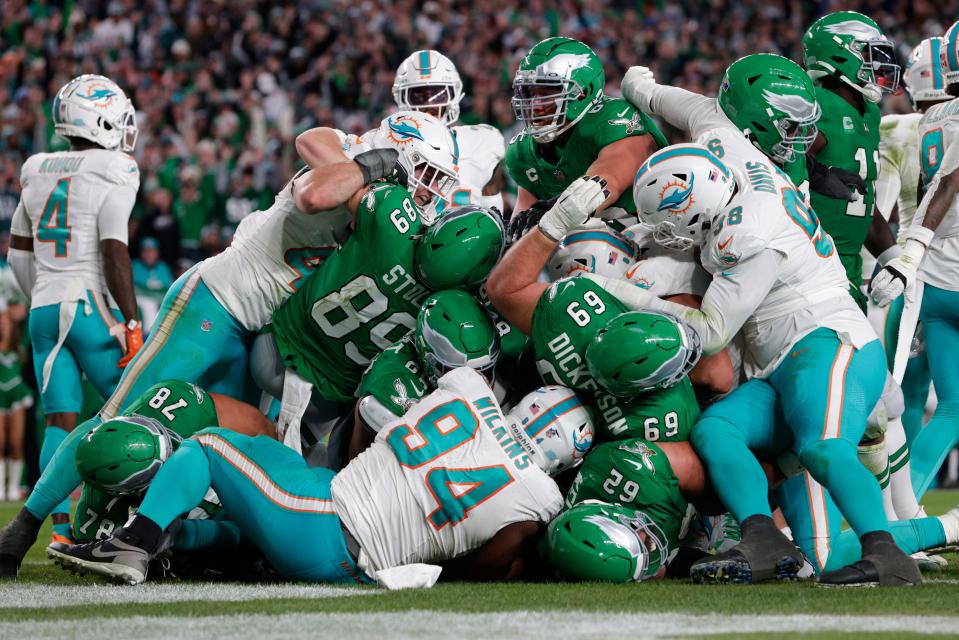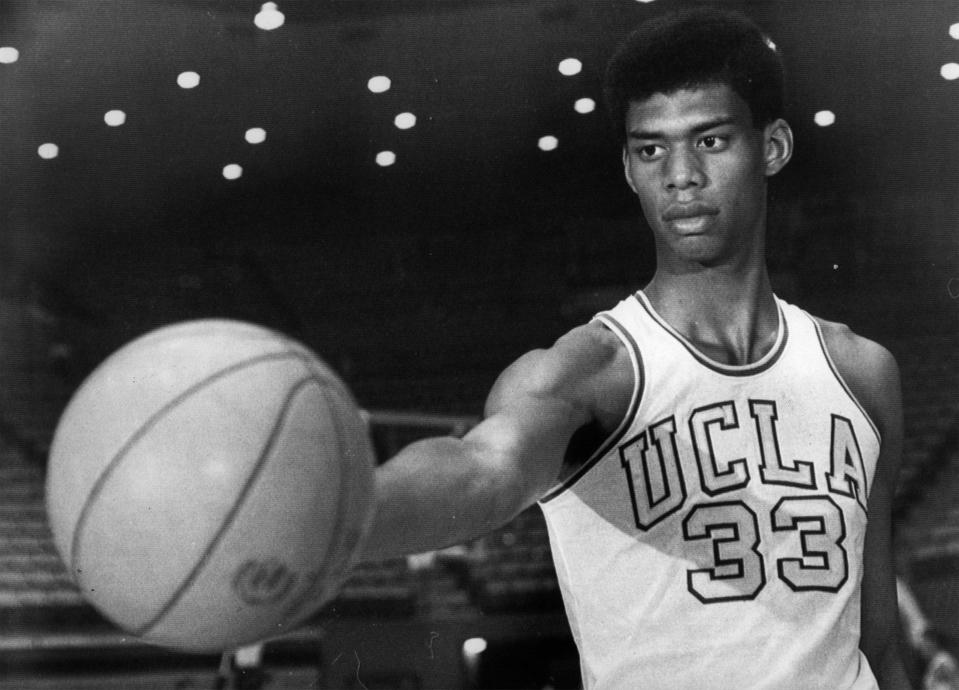Ban Eagles 'tush push'? Babe Ruth, Kareem Abdul-Jabbar, Big Mac special sauce reason not to
In 1920, Babe Ruth hit 54 home runs, or more than every other American League team.
In 1927, Ruth hit 60 home runs, also more than every other American League team.
The launch angles and exit velocity talked about back then − as legend would have it − were the angles at which Ruth could launch himself to the nearest bar, and the velocity of the beer pouring into his mouth.
Imagine if Major League Baseball banned the home run back then just because Ruth was hitting so many more than anybody else.
Actually, you don't have to.
EAGLES IN 2ND HALF: The Kelce-Swift combo that matters; tush push to Super Bowl?
MAKING THE GRADE: Eagles midseason report card: These 2 (not Jalen Hurts) get A+, but not all get high marks
That's because the NCAA, along with high schools, banned the slam dunk in 1967 because of a 7-foot-2 star at UCLA named Lew Alcindor. The NCAA ban stood until 1976.
If the ban had remained in place into the early 1980s, then Phi Slama Jama, the nickname given to the University of Houston basketball teams led by center Hakeem Olajuwon and forward Clyde Drexler, might have been named Phi Rebound Backboard.
Not quite the same.
Alcindor, who would later change his name to Kareem Abdul-Jabbar, and many others felt the rule was racially motivated. The rule makers denied this, saying it caused injuries and did not "display basketball skill − only height advantage," according to The Guardian.
Where have we heard that "injuries" excuse recently?
And that brings us to the so-called "tush push," or "Brotherly Shove," which the Eagles have used to unparalleled success this season. So much so that they are trying to trademark the term "Brotherly Shove."
How successful is the Eagles' 'tush push'?
Eagles coach Nick Sirianni said he considers every set of downs "1st-and-9" because if it gets to fourth-and-1, the Eagles are going for it.
And they are converting practically every time.
According to The Athletic, the Eagles were succeeding at a 93% clip this season, more than the league average of 78%.
The NFL's stats say the Eagles are 19-for-22 combined on running plays on third-and-1 and fourth-and-1, a conversion rate of 86.3%. Some of those, however, might be straight quarterback sneaks, or handoffs to a running back.
Either way, like Ruth, the Eagles are better at the "tush push" than everybody else. So why should the play be banned?
Yet that was the feeling of some league owners, who tried to get it abolished last spring at the owners' meetings, and will certainly try again this spring. And that is still the feeling of some opposing coaches, including Washington Commanders defensive coordinator Jack Del Rio.
"It’s a nice rugby play, and it’s not what we’re looking for in football," Del Rio said in the days before the Eagles played the Commanders on Oct. 1.
As for injuries, well, the Giants tried it in a recent game against the Seahawks and two offensive linemen left the game.
The Eagles have tried it more than anyone, and no one has been injured. And Sirianni says it's like anything else − the Eagles are going to keep doing it because they are so successful.
"You've seen it across the league that people can't do it like we can do it," he said. "I'm making my plug right there. Like, don't ban this play. Like, if everyone could do it, everybody would."
To be clear, we're not talking about a straight quarterback sneak. The Eagles' version refines the QB sneak to include two players lined up just behind quarterback Jalen Hurts, pushing Hurts as he grinds his legs forward behind the Eagles' massive offensive line.

'Tush push' is an art form, just like Babe Ruth's home runs
Yet there's nothing unique about the size of the Eagles' O-line. Hurts will often run − shuffle? push? − his way behind by 332-pound left guard Landon Dickerson, 295-pound center Jason Kelce, and to some extent 365-pound left tackle Jordan Mailata or 325-pound right tackle Lane Johnson, along with at least one tight end.
All the while, Hurts is trying to gain 1 yard before some defensive linemen, who can weigh around 340 pounds, or a linebacker leaping over the top, can stop him short.
Sounds simple, right?
Yet for years, the NFL had banned offensive players from pushing or pulling to aid a runner in any way until 2005. That's when the NFL allowed pushing, claiming it was too difficult to legislate. Pulling is still banned.
But there is an art to it, just as there was an art for Ruth to launch balls over the fence at a much greater rate than everybody else.

Hurts, for one, is legendary for squatting up to 600 pounds in high school, so he can churn his legs, while other quarterbacks might be stopped. He's also not 6-foot-5 or 6-6 like many quarterbacks. Hurts, at 6-1, has a lower center of gravity.
And that could make just enough of a difference when Kelce, Dickerson and the other linemen get low enough and push just far enough to create a sliver of space.
But that's about as far as many players are willing to go with detailing their strategy.
As Dickerson put it: "You don't go into McDonald's and ask for the Big Mac sauce recipe."
Added Hurts: "Not to pour more water into that jug, but it's something that we've been able to do at a high level. And it's clear that it doesn't always work for everyone else, so we just want to continue to execute whatever is called."
Eagles will call 'tush push' at any time, any situation
Against the Dolphins on Oct. 22, the Eagles called it twice on fourth-and-1 in their own territory, in the fourth quarter, leading by only a touchdown. Had they failed, Miami would have had a short field to score a potential game-tying touchdown.
The Eagles made it both times, then continued on to score the touchdown that put the game away.
They did it against the Cowboys in their 28-23 win on Nov. 5, with Hurts scoring a touchdown in the second quarter on third down. Then he converted two more in the third quarter even with an ailing knee.
Can Eagles' opponents figure out a way to stop 'tush push'?
The Cowboys, like everyone else, knew it was coming. They couldn't stop it.
"It’s good it’s being made a big deal and teams are frustrated by it," Kelce said. "It’s highly successful. Some would say unfair."
They were saying the same thing about Ruth and the home run in the 1920s. Eventually, other players figured it out. The home run is such a part of the game now that Phillies star Bryce Harper can know in a moment's notice that he had both the exit velocity and launch angle to hit one out in Game 7 of the NLCS, only to fall a few dozen feet short.
"I mean, 109 at 44," Harper said about the exit velocity and launch angle after the Phillies' loss, "so (the Diamondbacks pitcher) beat my barrel by a tenth of a second."
Clearly, baseball has evolved since Ruth, and so has basketball because of the dunk. And at some point, NFL defenses will find a way to stop the Eagles' tush push, or succeed enough with their own that they, too, can do it on command.
And perhaps that will change football, too, to the point where it'll be rare to see a team punt.
For now, consider the Eagles' 1-yard rugby scrum/mass of humanity the equivalent of Babe Ruth or Kareem Abdul-Jabbar.
Sure, it's not as majestic as a home run, or as emphatic as a slam dunk, but it's effective enough to change the game.
Even Kelce knows this.
"Defenses are doing a much better job," he said. "They’ve obviously put in a lot of time into coaching it and trying to figure out ways to stop it. My opinion is that will only open up other things. The whole emphasis is if you want to stop it, you have to go all out, and that will put advantages in our court."
Contact Martin Frank @mfrank@delawareonline.com. Follow on X @Mfranknfl.
This article originally appeared on Delaware News Journal: Ban Eagles 'tush push'? The Babe Ruth, Kareem Abdul-Jabbar, Big Mac case

